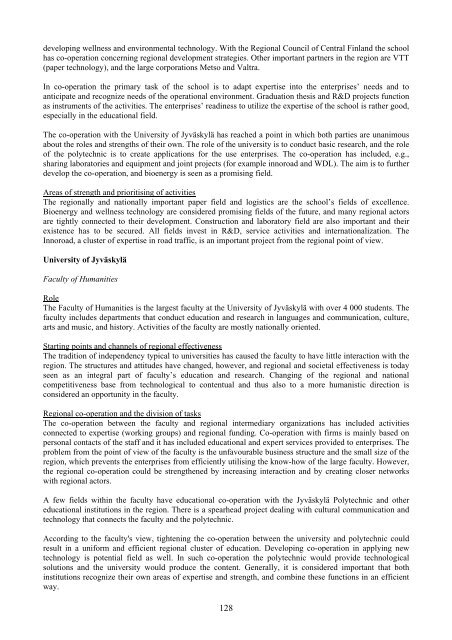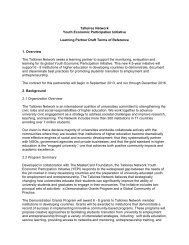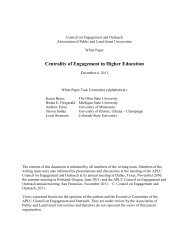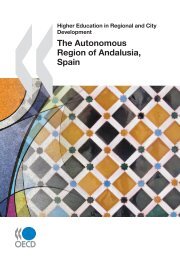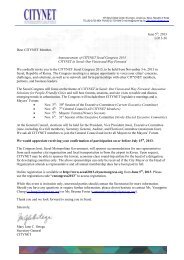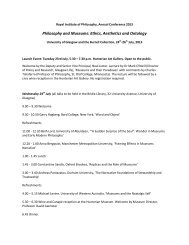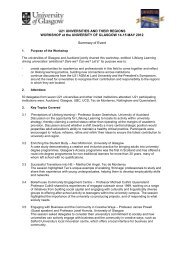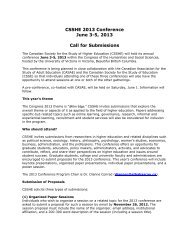<strong>Region</strong>al co-operation and the division of tasksPublic sector actors such as the Central <strong>Finland</strong> Health Care District, social and health services of the City ofJyväskylä and other municipalities in the region, and the Central <strong>Finland</strong>’s Centre of Expertise in SocialField (KOSKE) are important partners of the school. The co-operation includes joint development projectsconnected to service activities, students’ graduation thesis projects and co-operation in practical training andeducation. The <strong>Region</strong>al Council of Central <strong>Finland</strong> and State Provincial Office of Western <strong>Finland</strong> aresignificant partners in funding and strategy work. <strong>Region</strong>al co-operation with enterprises does not have asignificant role in the operation of the school at the moment, but the co-operation is expected to increase.The co-operation with the University of Jyväskylä varies between the different fields. Especially in the socialfield, instead of having synergetic and constructive co-operation, the educational institutions are beeninvolved in a partly competitive situation. The Gerocenter and location of the unit of the National Researchand Development Centre for Welfare and Health (STAKES) to Jyväskylä will provide new opportunities forco-operation between the polytechnic and university, and an opportunity to join their limited resources. Thismeans that the division of tasks should be clarified so that the university focuses on basic research, while thepolytechnic concentrates on applications. Co-operation requires trust and openness between the institutions.Areas of strength and prioritising of activitiesSolid educational know-how is the foundation of the school. Polytechnic master's degree provides anopportunity for developing working life, knowledge base and innovations in the future. The promising areasof regional development comprise of, e.g., developing customer-oriented methods and health impactassessment integrating preventive way of thinking of decision-makers, utilising of information networks (ewelfare),networked learning environments and internationality. From the entrepreneurial perspective, thehealth and social care is a new, developing field and it offers many opportunities. New service products anddeveloping working methods are in a key position.Increasing funding by extending the project activities is almost necessary to secure the future of the school.This requires changing the curriculum so that it allows more opportunities for the active regionaldevelopment work.School of Engineering and TechnologyRoleThe School of Engineering and Technology provides bachelor's degree education in engineering andlaboratory sciences, master’s level and further education, research and development services, andeducational, expert and laboratory services. Jyväskylä Polytechnic’s is the most popular school ofengineering in <strong>Finland</strong> if measured by annual number of applicants.The activities of the school are nationally and regionally oriented, but it is also a strong actor at theinternational level. According to the vision of the school, the regional effectiveness is achieved throughnational and international competitiveness.Starting points and channels of regional effectivenessThe core competence of the school is closely connected to regional development. The main part of the staffis able to create networks and work at the interface of regional development. The location of the Jyväskyläregion, network of regional actors and the large enterprises in the region provide excellent preconditions forthe operation of the school.<strong>Region</strong>al research and development projects provide a foundation for strengthening the school’s competenceand activities, for expanding the networks and for deepening co-operation with enterprises. The expertise ofthe school is already widely recognized in the region.<strong>Region</strong>al co-operation and the division of tasksOf the regional intermediary organization, co-operation aiming at developing projects and services has beencarried out with the Jyväskylä <strong>Region</strong>al Development Company Jykes Ltd. The role of the polytechnic hasbeen to produce substance knowledge, while Jykes has concentrated on marketing, communications andfinancial transactions. Co-operation with the Jyväskylä Science Park is concentrated on projects of127
developing wellness and environmental technology. With the <strong>Region</strong>al Council of Central <strong>Finland</strong> the schoolhas co-operation concerning regional development strategies. Other important partners in the region are VTT(paper technology), and the large corporations Metso and Valtra.In co-operation the primary task of the school is to adapt expertise into the enterprises’ needs and toanticipate and recognize needs of the operational environment. Graduation thesis and R&D projects functionas instruments of the activities. The enterprises’ readiness to utilize the expertise of the school is rather good,especially in the educational field.The co-operation with the University of Jyväskylä has reached a point in which both parties are unanimousabout the roles and strengths of their own. The role of the university is to conduct basic research, and the roleof the polytechnic is to create applications for the use enterprises. The co-operation has included, e.g.,sharing laboratories and equipment and joint projects (for example innoroad and WDL). The aim is to furtherdevelop the co-operation, and bioenergy is seen as a promising field.Areas of strength and prioritising of activitiesThe regionally and nationally important paper field and logistics are the school’s fields of excellence.Bioenergy and wellness technology are considered promising fields of the future, and many regional actorsare tightly connected to their development. Construction and laboratory field are also important and theirexistence has to be secured. All fields invest in R&D, service activities and internationalization. TheInnoroad, a cluster of expertise in road traffic, is an important project from the regional point of view.University of JyväskyläFaculty of HumanitiesRoleThe Faculty of Humanities is the largest faculty at the University of Jyväskylä with over 4 000 students. Thefaculty includes departments that conduct education and research in languages and communication, culture,arts and music, and history. Activities of the faculty are mostly nationally oriented.Starting points and channels of regional effectivenessThe tradition of independency typical to universities has caused the faculty to have little interaction with theregion. The structures and attitudes have changed, however, and regional and societal effectiveness is todayseen as an integral part of faculty’s education and research. Changing of the regional and nationalcompetitiveness base from technological to contentual and thus also to a more humanistic direction isconsidered an opportunity in the faculty.<strong>Region</strong>al co-operation and the division of tasksThe co-operation between the faculty and regional intermediary organizations has included activitiesconnected to expertise (working groups) and regional funding. Co-operation with firms is mainly based onpersonal contacts of the staff and it has included educational and expert services provided to enterprises. Theproblem from the point of view of the faculty is the unfavourable business structure and the small size of theregion, which prevents the enterprises from efficiently utilising the know-how of the large faculty. However,the regional co-operation could be strengthened by increasing interaction and by creating closer networkswith regional actors.A few fields within the faculty have educational co-operation with the Jyväskylä Polytechnic and othereducational institutions in the region. There is a spearhead project dealing with cultural communication andtechnology that connects the faculty and the polytechnic.According to the faculty's view, tightening the co-operation between the university and polytechnic couldresult in a uniform and efficient regional cluster of education. Developing co-operation in applying newtechnology is potential field as well. In such co-operation the polytechnic would provide technologicalsolutions and the university would produce the content. Generally, it is considered important that bothinstitutions recognize their own areas of expertise and strength, and combine these functions in an efficientway.128
- Page 1 and 2:
OECD/IMHE ‐ Supporting thecontrib
- Page 3 and 4:
SUMMARYTogether with 13 other regio
- Page 5 and 6:
8.2 Increasing the regional effecti
- Page 7 and 8:
I INTRODUCTION1.1 Strengthening the
- Page 9 and 10:
development. The aim is that region
- Page 11 and 12:
The self-evaluation considered here
- Page 13 and 14:
densely populated cities in Finland
- Page 15 and 16:
1,9 %1,7 %1,5 %1,3 %Population chan
- Page 17 and 18:
The share of jobs in primary produc
- Page 19 and 20:
New pillars of future’s developme
- Page 21 and 22:
Jyväskylä0,60,91,11,0Central Finl
- Page 23 and 24:
2.4 Governance StructureMunicipalit
- Page 25 and 26:
of its development outside the cent
- Page 27 and 28:
III CHARACTERISTICS OF THE HIGHER E
- Page 29 and 30:
continuing education and open unive
- Page 31 and 32:
The Science and Technology Policy C
- Page 33 and 34:
3.2 Regional dimension within the n
- Page 35 and 36:
order to respond to the challenges
- Page 37 and 38:
14001200Master's degreesDoctoratesN
- Page 39 and 40:
900800Youth graduatedAdult graduate
- Page 41 and 42:
provide information for the basis o
- Page 43 and 44:
CabinetParliamentSTPCSteering (andf
- Page 45 and 46:
5,04,0Billion euros3,02,01,00,083 8
- Page 47 and 48:
The number of refereed articles is
- Page 49 and 50:
Centre of expertisePaper industryBi
- Page 51 and 52:
The Institute for Environmental Res
- Page 53 and 54:
and systematic gradually progressin
- Page 55 and 56:
are seen to be very important chann
- Page 57 and 58:
Internal support units of HEIsThe F
- Page 59 and 60:
of interviewed HEI staffs, the coop
- Page 61 and 62:
areas of the region’s Centre of E
- Page 63 and 64:
system of Jyväskylä and the HEIs
- Page 65 and 66:
V CONTRIBUTION OF TEACHING AND LEAR
- Page 67 and 68:
esources to establish new activitie
- Page 69 and 70:
The main problem for the Finnish la
- Page 71 and 72:
longer. 2.5% of the Jyväskylä Pol
- Page 73 and 74:
activities. As a part of the new qu
- Page 75 and 76:
education programmes consisting of
- Page 77 and 78: the TE-Centre of Central Finland an
- Page 79 and 80: practices in the provision of educa
- Page 81 and 82: Reason forskillupgradingDescription
- Page 83 and 84: Strengths+ HEIs are actively confro
- Page 85 and 86: taxation, to lower the unemployment
- Page 87 and 88: Box 6.2 The WIRE -projects: Support
- Page 89 and 90: indoor ice-skating rink, the Rauhal
- Page 91 and 92: The School of Cultural Studies at t
- Page 93 and 94: the number of registered customers
- Page 95 and 96: Box 6.9 Environmental management in
- Page 97 and 98: Strengths+ The significance of HEIs
- Page 99 and 100: eferring to the regional developmen
- Page 101 and 102: Key topics relating to changes in t
- Page 103 and 104: participation in the decision makin
- Page 105 and 106: in the strategy-making process. The
- Page 107 and 108: 7.5 Critical points in promoting th
- Page 109 and 110: 7.Cooperation in strategies concern
- Page 111 and 112: egion is according to national and
- Page 113 and 114: oundaries for further developmental
- Page 115 and 116: joining resources and operations by
- Page 117 and 118: Discussion proposal 15: To ensure d
- Page 119 and 120: achieved by the horizontal utilizat
- Page 121 and 122: Appendix 2 Information on data used
- Page 123 and 124: and finding synergy between the oth
- Page 125 and 126: School of BusinessRoleThe School of
- Page 127: The challenge of the school from re
- Page 131 and 132: Faculty of EducationRoleThe Faculty
- Page 133 and 134: and/or graduation thesis is a signi
- Page 135 and 136: Areas of strength and prioritising
- Page 137 and 138: Agora Center’s partners from the
- Page 139 and 140: Currently the priority of ITRI’s
- Page 141 and 142: Weak spots and areas to develop in
- Page 143 and 144: Employment and Economic Development
- Page 145 and 146: Appendix 3 Analysis of the most sig
- Page 147 and 148: Appendix 4 Regional effects (input-
- Page 149 and 150: The overall value of production cre
- Page 151 and 152: Appendix 5 Reform of regional struc
- Page 153 and 154: Appendix 7 Provision of education i
- Page 155 and 156: Appendix 8 Statistical information
- Page 157 and 158: Appendix 10 Statistics on financing
- Page 159 and 160: Appendix 12 Labour market activity
- Page 161 and 162: Appendix 14 Master’s Programmes a
- Page 163 and 164: Uusiutuvan energian tutkimusohjelma
- Page 165 and 166: BIBLIOGRAPHYAcademy of Finland (200


